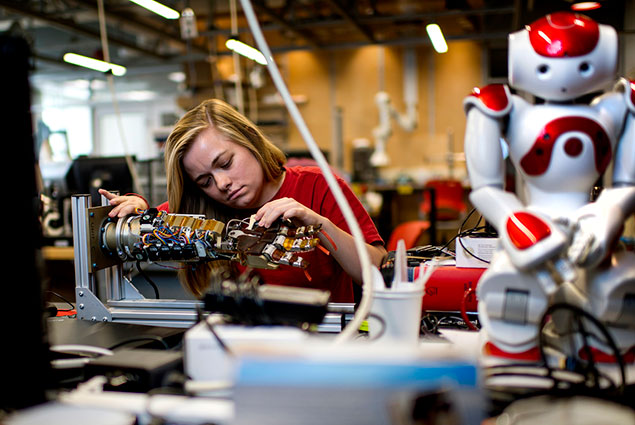
Artificial intelligence (AI) has become a ubiquitous presence in our lives, from the moment we check the weather on our smartphones to the algorithms curating our social media feeds.
However, discussions about AI often veer into dystopian territory, painting a picture of robots replacing human workers and ushering in an era of mass unemployment.
While automation is undeniably a consequence of technological advancement, the reality of AI is far more nuanced. Here, we explore how AI, specifically through advanced Android-powered apps, robots, and devices, is poised to become a powerful partner, not a competitor, making our lives demonstrably easier and more fulfilling.
The concept of artificial intelligence has captivated humanity for decades, from the fictional robots of Isaac Asimov’s novels to the sentient machines of Hollywood blockbusters. While these portrayals often depict AI as a threat to human dominance, the reality is far less dramatic.
Modern AI is a complex web of algorithms designed to mimic human cognitive functions like learning, problem-solving, and decision-making. These algorithms are trained on massive datasets, allowing them to identify patterns, make predictions, and perform tasks with ever-increasing accuracy.
The field of AI is constantly evolving, with new advancements emerging at a rapid pace. However, it’s important to understand that current AI is not capable of independent thought or consciousness.
Instead, AI excels at specific tasks, particularly those that involve large amounts of data or repetitive processes. This targeted ability makes AI a powerful tool for augmentation, not replacement.
The Android operating system, with its vast array of apps and devices, is at the forefront of integrating AI into our daily lives. Here’s a glimpse into how AI-powered Android technology is transforming various aspects of our world:
Imagine a world where your morning routine is orchestrated by a helpful companion. Android-powered smart speakers and virtual assistants like Google Assistant can wake you up with gentle music, adjust the room temperature to your preference, and even brew your coffee based on pre-programmed settings.
Throughout the day, AI assistants can manage your schedule, navigate traffic with real-time updates, and even handle repetitive tasks like booking appointments or sending reminders. This frees up valuable mental space and allows you to focus on the more critical aspects of your day.
AI isn’t just about managing your personal life; it can significantly enhance your professional endeavors as well. AI-powered tools like Grammarly and plagiarism checkers can ensure your writing is polished and error-free. Project management apps leverage AI to analyze data, automate reports, and identify potential roadblocks before they arise.
AI-powered research assistants can delve into vast datasets, surfacing relevant information and saving you countless hours of research. This translates to increased efficiency and productivity, allowing you to dedicate more time to strategic thinking, innovation, and client interaction. The beauty of AI lies in its ability to learn and adapt.
Android-based AI assistants are constantly evolving, understanding your preferences and habits over time. Imagine a fitness app that curates personalized workout plans based on your fitness level and goals.
Or a music streaming service that recommends new artists and songs tailored to your taste. The possibilities for personalization are vast, extending beyond entertainment to areas like healthcare, where AI can recommend personalized treatment plans or suggest preventative measures based on your health data. The impact of AI extends far beyond personal assistants and smartphone apps.
AI-powered robots are transforming industries like manufacturing and healthcare. In factories, robots can handle dangerous or repetitive tasks with unmatched precision, freeing up human workers to focus on quality control and innovation. In the healthcare sector, AI-powered tools are assisting doctors with diagnoses by analyzing medical images and patient data.
AI can also be used to develop personalized treatment plans and predict potential health risks. These advancements not only improve efficiency but also have the potential to save lives.
While AI automates tasks and streamlines processes, it’s important to remember that it cannot replace human ingenuity, creativity, and empathy. The true power of AI lies in its ability to augment human capabilities.
By automating mundane chores and repetitive tasks, AI frees us to focus on our strengths and passions. Imagine a world where doctors are aided by AI during complex surgeries, allowing them to perform procedures with greater accuracy and efficiency. Or consider a future where architects and engineers collaborate with AI design tools, creating innovative structures that were once unimaginable.
The potential of AI extends far beyond improving productivity and personal convenience. AI can be a powerful tool for tackling some of humanity’s most pressing challenges:
-
AI can be used to analyze vast datasets on climate patterns, predict extreme weather events, and optimize energy use. AI-powered tools can also support the development of renewable energy sources and sustainable practices.
-
AI can be instrumental in early disease detection, drug discovery, and personalized medicine. AI algorithms can analyze medical images to identify potential health risks and even predict outbreaks of infectious diseases.
-
AI-powered tutoring systems can personalize learning experiences for students, catering to individual learning styles and needs. AI can also be used to develop adaptive learning materials that adjust to a student’s progress.
As with any powerful technology, AI development and implementation come with ethical considerations. Issues like data privacy, bias in algorithms, and the potential for job displacement need to be addressed proactively. Here are some key points to consider:
-
AI algorithms should be designed with transparency in mind, allowing users to understand how decisions are made. This is crucial for building trust and ensuring fairness.
-
The vast amounts of data used to train Android AI systems raise concerns about privacy. Robust data security measures and user consent are essential to protect personal information.
-
AI algorithms can perpetuate societal biases if trained on biased datasets. Developers need to be mindful of potential biases and actively work to mitigate them.
-
AI should never be a black box operating without human oversight. Humans should be responsible for setting parameters, monitoring performance, and ensuring ethical use of AI technology.
Fears of a robot takeover are unfounded. Instead, Android and AI has the potential to become a powerful partner, augmenting human capabilities and empowering us to achieve more than ever before. The future is not about humans versus machines; it’s about humans and machines working together to build a better tomorrow.












